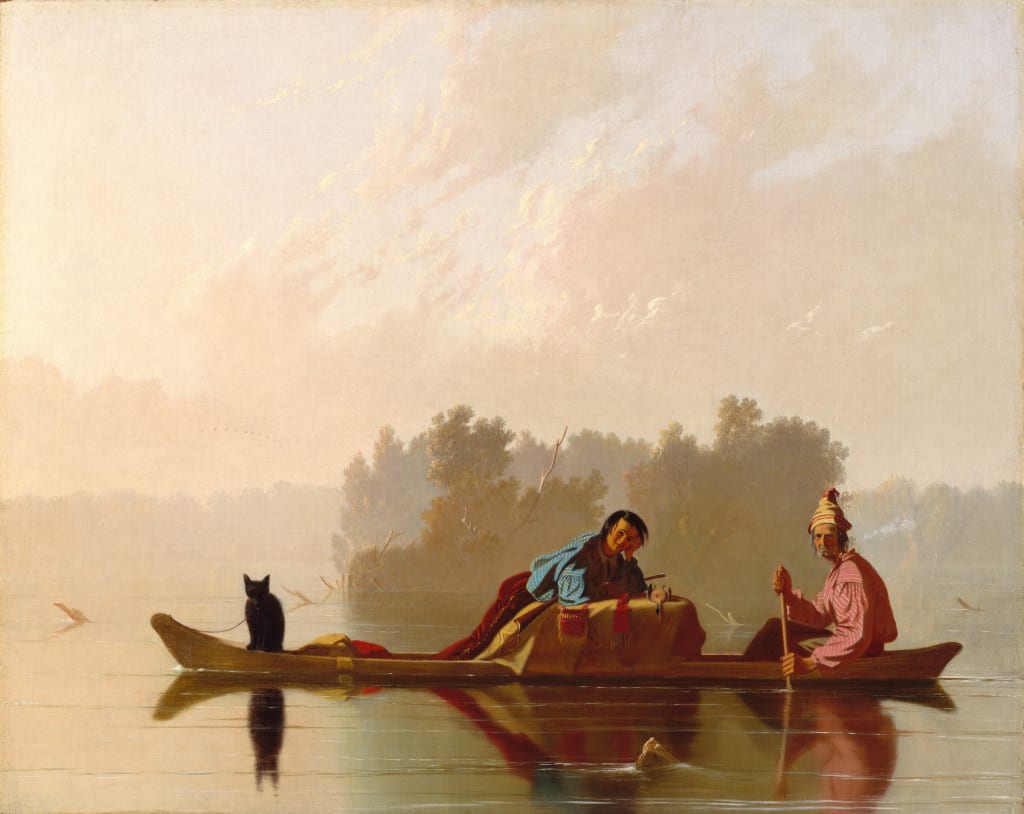
It’s the wet season; an imperial messenger sails down the Chobe River with a parcel wrapped in tawny papyrus.
The messenger scans the horizon with a blended sense of wonder and disappointment. As widely as the land stretches on either side, with its golden reeds and flowery hills, he is contained by the swollen banks of the somnolent river. Without the slightest effort, it seems, the river carries him on to his destination, to deliver his parcel to its destined recipient.
In this singular moment a fantastical trinity forms; the past and future stand on either side of the messenger, as would two guards escorting a prisoner.
The messenger considers the years that have borne him here. In his mind’s languid eye he sees the palatial ruins in which, as a child, he gathered fragments of precious stone. These were bought up by a local merchant and ferried to a distant capital, where — the messenger was told in childhood — they would become tesserae in that city’s sacred mosaics.
At that time he could hardly imagine what figures were there pieced together from his stones, or whether they measured any more than a hand’s length.
In the dust he’d made his own attempts at figures, rendering shepherds with crooks and waggish beards, maidens with overfull gourds, grinning skulls, dancing skeletons, five-legged beasts, and the stolid face — as best he could remember it — of his mother. These stones he scattered when it came time for the merchant to carry them off.
In an instant, as it now seems to his foreshortened, retrospective gaze, he saved enough money to reach that faraway city, saw for himself what became of his stones, made a small fortune in replacing the merchant, and proved himself useful enough to be entrusted with imperial service.
It was his temperance and sense of proportion that brought him success. These had guided him effortlessly, involuntarily, rather as a boat will rest on its ballast.
Yet in this the messenger has of late found himself in unfamiliar waters. Increasingly he senses, at every turn in the road or bend in the river, that his way in life is narrowed by forces beyond his control.
His purpose, in the course of his duties, has already become superfluous. And in fact he never was troubled to think about what that purpose might be, not since he freed himself from poverty’s needy embrace.
Yes, thinks the messenger, perhaps in the course of my duties I’ve handed over the very reigns of my life; for although I consider my responsibilities to be most august, I cannot help but yearn for the horizons that stretch beyond this river’s commercial channel.
The parcel, wrapped in walnut-stained papyrus, is a mystery to the messenger, it being the practice of the imperial service to send all packages, no matter how consequential, in the least conspicuous manner. In most instances, as indeed in this one, the messenger gets not the slightest hint as to its contents.
This had never troubled the messenger, who carried out his duties without a scruple. It did not matter to him whether he carried gold pieces, church relics, or execution orders; he was trusted in any case for his unfailing loyalty to the emperor.
And so, if at times he found himself sailing down a river of his own tears, casting a wake that was not his own, he did so proudly.
After all, what could the parcel possibly contain? A parcel is often so much grander than its contents, if only for its mystery; if only for the element of chance that makes one thing and another equally possible. It is lust, sheer lust, that tempts the messenger to discover the contents of the parcel, and lust is useful only to the artist, for whom a curious passion is indispensable. For the messenger, it is only a hazard.
So surmises the messenger, for whom these thoughts are helping to pass the time.
An artist, thinks the messenger, was I not an artist in the dust, conjuring beasts with lacquered stones? Had I not more freedom then, penniless and without a responsibility except for that of my own mouth?
The messenger lifts the parcel. It weighs about the same as a bundle of stones.
A parcel is often more grand than its contents; but this parcel presents nothing to the eye, and so the reverse must be true. Its blandness, then, is a subtle dissuasion.
The messenger turns his curious eye to the turbid, ink-black waters below the transom of the boat. His reflection, undulated by the boat’s passage, cooly stares back. He hardly recognizes it, nodding his head to make sure it really does belong to him. He looks up again. His attendants vacantly guide the boat; they take no notice of him.
The river, the messenger suddenly remembers, is a wrapped parcel itself: it reveals nothing of the creatures lying at bottom, among whom crocodiles could be counted. Indeed, as the boat makes its way down the river it raises parties of these colossal reptiles and sends them scuttling into the water in splashes of brackish green foam.
That the contents of parcels are dangerous to the messenger, he recalls, was a lesson imparted by the imperial service. It's only once a delivery is completed that the contents can be safely revealed — if the recipient so chooses to allow it.
Much like life itself, the messenger concludes, leaning comfortably against the transom with his meerschaum pipe. If I’m lucky I might know, at the very end, what it ever was for.
The day is drawing to a close; the sun settles down on the western horizon. A nearby fisherman, standing on the bow of a dugout canoe, casts his net into the coruscating waters.
About the Creator
Willa Chernov
Willa Chernov is a writer and translator living in New York.






Comments
There are no comments for this story
Be the first to respond and start the conversation.